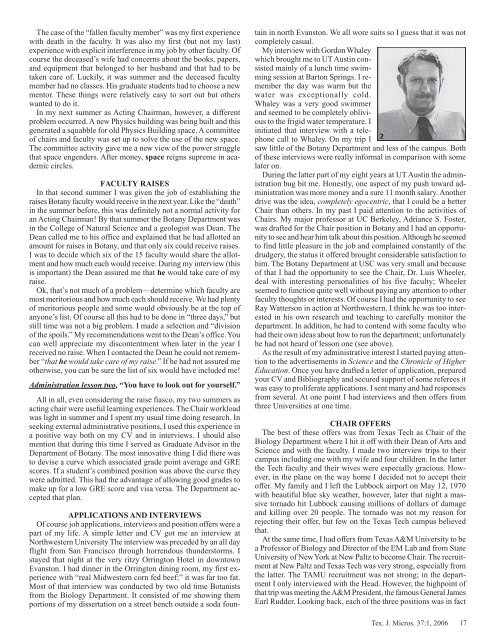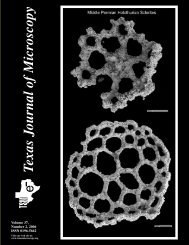Texas Journal of Microscopy Texas Journal of Microscopy
Texas Journal of Microscopy Texas Journal of Microscopy
Texas Journal of Microscopy Texas Journal of Microscopy
Create successful ePaper yourself
Turn your PDF publications into a flip-book with our unique Google optimized e-Paper software.
The case <strong>of</strong> the “fallen faculty member” was my first experience<br />
with death in the faculty. It was also my first (but not my last)<br />
experience with explicit interference in my job by other faculty. Of<br />
course the deceased’s wife had concerns about the books, papers,<br />
and equipment that belonged to her husband and that had to be<br />
taken care <strong>of</strong>. Luckily, it was summer and the deceased faculty<br />
member had no classes. His graduate students had to choose a new<br />
mentor. These things were relatively easy to sort out but others<br />
wanted to do it.<br />
In my next summer as Acting Chairman, however, a different<br />
problem occurred. A new Physics building was being built and this<br />
generated a squabble for old Physics Building space. A committee<br />
<strong>of</strong> chairs and faculty was set up to solve the use <strong>of</strong> the new space.<br />
The committee activity gave me a new view <strong>of</strong> the power struggle<br />
that space engenders. After money, space reigns supreme in academic<br />
circles.<br />
FACULTY RAISES<br />
In that second summer I was given the job <strong>of</strong> establishing the<br />
raises Botany faculty would receive in the next year. Like the “death”<br />
in the summer before, this was definitely not a normal activity for<br />
an Acting Chairman! By that summer the Botany Department was<br />
in the College <strong>of</strong> Natural Science and a geologist was Dean. The<br />
Dean called me to his <strong>of</strong>fice and explained that he had allotted an<br />
amount for raises in Botany, and that only six could receive raises.<br />
I was to decide which six <strong>of</strong> the 15 faculty would share the allotment<br />
and how much each would receive. During my interview (this<br />
is important) the Dean assured me that he would take care <strong>of</strong> my<br />
raise.<br />
Ok, that’s not much <strong>of</strong> a problem—determine which faculty are<br />
most meritorious and how much each should receive. We had plenty<br />
<strong>of</strong> meritorious people and some would obviously be at the top <strong>of</strong><br />
anyone’s list. Of course all this had to be done in “three days,” but<br />
still time was not a big problem. I made a selection and “division<br />
<strong>of</strong> the spoils.” My recommendations went to the Dean’s <strong>of</strong>fice. You<br />
can well appreciate my discontentment when later in the year I<br />
received no raise. When I contacted the Dean he could not remember<br />
“that he would take care <strong>of</strong> my raise.” If he had not assured me<br />
otherwise, you can be sure the list <strong>of</strong> six would have included me!<br />
Administration lesson two, “You have to look out for yourself.”<br />
All in all, even considering the raise fiasco, my two summers as<br />
acting chair were useful learning experiences. The Chair workload<br />
was light in summer and I spent my usual time doing research. In<br />
seeking external administrative positions, I used this experience in<br />
a positive way both on my CV and in interviews. I should also<br />
mention that during this time I served as Graduate Advisor in the<br />
Department <strong>of</strong> Botany. The most innovative thing I did there was<br />
to devise a curve which associated grade point average and GRE<br />
scores. If a student’s combined position was above the curve they<br />
were admitted. This had the advantage <strong>of</strong> allowing good grades to<br />
make up for a low GRE score and visa versa. The Department accepted<br />
that plan.<br />
APPLICATIONS AND INTERVIEWS<br />
Of course job applications, interviews and position <strong>of</strong>fers were a<br />
part <strong>of</strong> my life. A simple letter and CV got me an interview at<br />
Northwestern University The interview was preceded by an all day<br />
flight from San Francisco through horrendous thunderstorms. I<br />
stayed that night at the very ritzy Orrington Hotel in downtown<br />
Evanston. I had dinner in the Orrington dining room, my first experience<br />
with “real Midwestern corn fed beef;” it was far too fat.<br />
Most <strong>of</strong> that interview was conducted by two old time Botanists<br />
from the Biology Department. It consisted <strong>of</strong> me showing them<br />
portions <strong>of</strong> my dissertation on a street bench outside a soda foun-<br />
tain in north Evanston. We all wore suits so I guess that it was not<br />
completely casual.<br />
My interview with Gordon Whaley<br />
which brought me to UT Austin consisted<br />
mainly <strong>of</strong> a lunch time swimming<br />
session at Barton Springs. I remember<br />
the day was warm but the<br />
water was exceptionally cold.<br />
Whaley was a very good swimmer<br />
and seemed to be completely oblivious<br />
to the frigid water temperature. I<br />
initiated that interview with a telephone<br />
call to Whaley. On my trip I<br />
saw little <strong>of</strong> the Botany Department and less <strong>of</strong> the campus. Both<br />
<strong>of</strong> these interviews were really informal in comparison with some<br />
later on.<br />
During the latter part <strong>of</strong> my eight years at UT Austin the administration<br />
bug bit me. Honestly, one aspect <strong>of</strong> my push toward administration<br />
was more money and a sure 11 month salary. Another<br />
drive was the idea, completely egocentric, that I could be a better<br />
Chair than others. In my past I paid attention to the activities <strong>of</strong><br />
Chairs. My major pr<strong>of</strong>essor at UC Berkeley, Adriance S. Foster,<br />
was drafted for the Chair position in Botany and I had an opportunity<br />
to see and hear him talk about this position. Although he seemed<br />
to find little pleasure in the job and complained constantly <strong>of</strong> the<br />
drudgery, the status it <strong>of</strong>fered brought considerable satisfaction to<br />
him. The Botany Department at USC was very small and because<br />
<strong>of</strong> that I had the opportunity to see the Chair, Dr. Luis Wheeler,<br />
deal with interesting personalities <strong>of</strong> his five faculty; Wheeler<br />
seemed to function quite well without paying any attention to other<br />
faculty thoughts or interests. Of course I had the opportunity to see<br />
Ray Watterson in action at Northwestern. I think he was too interested<br />
in his own research and teaching to carefully monitor the<br />
department. In addition, he had to contend with some faculty who<br />
had their own ideas about how to run the department; unfortunately<br />
he had not heard <strong>of</strong> lesson one (see above).<br />
As the result <strong>of</strong> my administrative interest I started paying attention<br />
to the advertisements in Science and the Chronicle <strong>of</strong> Higher<br />
Education. Once you have drafted a letter <strong>of</strong> application, prepared<br />
your CV and Bibliography and secured support <strong>of</strong> some referees it<br />
was easy to proliferate applications. I sent many and had responses<br />
from several. At one point I had interviews and then <strong>of</strong>fers from<br />
three Universities at one time.<br />
CHAIR OFFERS<br />
The best <strong>of</strong> these <strong>of</strong>fers was from <strong>Texas</strong> Tech as Chair <strong>of</strong> the<br />
Biology Department where I hit it <strong>of</strong>f with their Dean <strong>of</strong> Arts and<br />
Science and with the faculty. I made two interview trips to their<br />
campus including one with my wife and four children. In the latter<br />
the Tech faculty and their wives were especially gracious. However,<br />
in the plane on the way home I decided not to accept their<br />
<strong>of</strong>fer. My family and I left the Lubbock airport on May 12, 1970<br />
with beautiful blue sky weather, however, later that night a massive<br />
tornado hit Lubbock causing millions <strong>of</strong> dollars <strong>of</strong> damage<br />
and killing over 20 people. The tornado was not my reason for<br />
rejecting their <strong>of</strong>fer, but few on the <strong>Texas</strong> Tech campus believed<br />
that.<br />
At the same time, I had <strong>of</strong>fers from <strong>Texas</strong> A&M University to be<br />
a Pr<strong>of</strong>essor <strong>of</strong> Biology and Director <strong>of</strong> the EM Lab and from State<br />
University <strong>of</strong> New York at New Paltz to become Chair. The recruitment<br />
at New Paltz and <strong>Texas</strong> Tech was very strong, especially from<br />
the latter. The TAMU recruitment was not strong; in the department<br />
I only interviewed with the Head. However, the highpoint <strong>of</strong><br />
that trip was meeting the A&M President, the famous General James<br />
Earl Rudder. Looking back, each <strong>of</strong> the three positions was in fact<br />
Tex. J. Micros. 37:1, 2006<br />
17




